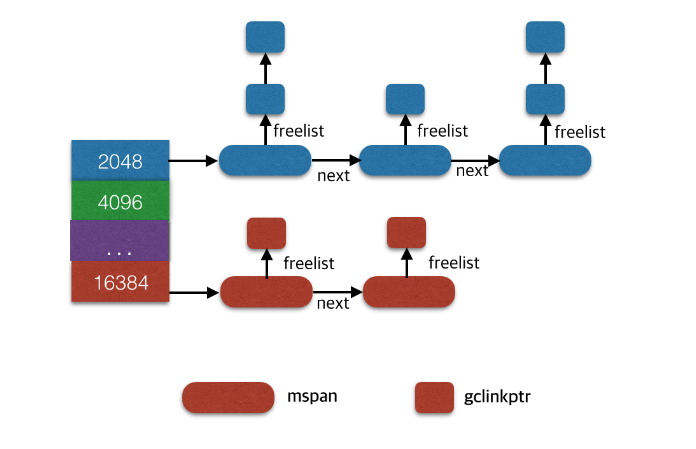golang 栈内存介绍
golang中栈内存用来存储函数内变量、执行函数调用等。在golang函数、协程退出后,其占用的栈内存也会一同被释放。
实际应用中协程的启动、退出可能会比较频繁,runtime必须要做点什么来保证启动、销毁协程的代价尽量小。而申请、释放stack空间所需内存则是一个比较大的开销,因此,go runtime采用了stack cache pool来缓存一定数量的stack memory。申请时从stack cache pool分配,释放时首先归还给stack cache pool。
核心数据结构
golang 栈内存的主要数据结构:
- mcache: mcache中的stackcache管理不同规格(class)的mspan:规格相同的mspan被链接到同一个链表中。
- stackpool:全局stack cache, 和mcache中的stackcache结构相同。
- stackLarge:全局stack cache, 和mcache中的stackcache结构相同。不同的是stackLarge中stack内存的规格。
其中stackcache的结构如下图所示:

栈内存分配算法
栈内存管理的核心思想和堆内存很像。在分配时,首先查找线程内stackcache是否有足够的空间,如果有足够的空间,则进行分配,避免了线程间竞争,提高了效率;若线程内stackcache内存不足,则会向全局stackpool中申请一批stack,按照规格进行切分后,放入到线程的stackcache中,然后再次进行分配。
普通栈内存分配(<32KB)
如上所述,首先会进行一些检查,找到合适的mspan规格、检查是否开启了stackCache、gc状态等。然后先检查本地stackcache相应的mspan list是否为空,如果为空,则会向全局的stackpoo申请一批stack,然后进行分配。
1 | order := uint8(0) |
大块栈内存分配(>=32KB)
对于大块栈内存,会直接在全局的stackLarge上进行分配,如果全局的stackLarge内存不足,则会向mHeap申请内存,然后再进行分配。
1 |
|
reference
- golang soruce code 1.10
- https://tracymacding.gitbooks.io/implementation-of-golang/content/memory/memory_stack.html